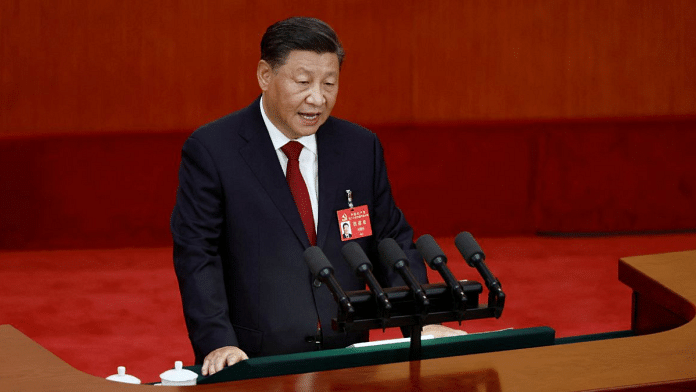New Delhi: The President Xi Jinping-led government’s reported push for women to “foster a new type of marriage and childbearing culture” in China reflects a shift towards a more conservative policy in the country which had promoted women’s empowerment at a UN conference in Beijing less than three decades ago.
The 1995 Fourth World Conference on Women in Beijing had culminated in 189 countries adopting the Beijing Declaration and the Platform for Action, considered a key global policy document on gender equality.
However, speaking at the 13th National Women’s Congress this week, Xi reportedly said, “Doing a good job in women’s work is not only related to women’s own development, but also related to family harmony, social harmony, national development and national progress,”. He also emphasised the importance of guiding young people’s views on marriage, childbirth and more.
This is partly believed to be born of China’s demographic challenge. Its population aged above 65 is expected to double from 172 million (12 percent) to 366 million (26 percent) in the next 30 years. China also reported its first population decline in six decades in 2022— a reported drop of almost 850,000 people.
“It is necessary to tell good family tradition stories, guide women to play their unique role in carrying forward the traditional virtues of the Chinese nation, establish good family traditions, and create a new trend of family civilization,” Xi said.
According to Dr Gunjan Singh, assistant professor at OP Jindal Global University, Xi has made the subject of family welfare and childbirth an issue of national rejuvenation.
“Facing a declining population for the first time, he is pushing women to focus on their familial role and trying to clearly define a woman’s role,” Singh told ThePrint Friday.
However, China’s declining and ageing population are not entirely natural. The country’s ‘One Child’ policy, which lasted for more than three decades, affected its population structure. The policy, introduced in 1980, limited each family to one child, except for some minorities and in case the first child had some disabilities.
“The CCP (Chinese Communist Party) has been controlling women’s bodies for a long time. From the one-child policy to now asking women to have more children, the government has always been dictating what women should do with their bodies,” Singh explained.
This policy has reportedly caused a disproportionate sex ratio, an increasingly ageing population as well as a rise in undocumented children due to stringent laws.
Also Read: China’s population dips for 1st time since 1960, gap with India narrows to less than 4 crore
Decline in political participation
A forum for the Chinese Communist Party to showcase its commitment to women, the Women’s Congress is held every five years.
While it has increasingly become significant over the years, this is the first time both Xi’s Standing Committee as well as the Politburo, the executive body of the CCP, does not have a single woman member.
Women only comprise 7.9 percent of the Central Committee of the CCP, its political body, with only 30 women among the 376 members.
“History shows that women never had strong political participation within the CCP. From Mao to Xi, this has been a clear indication,” Singh added.
Raising children expensive
Apart from an ageing population, there are numerous reasons behind Xi’s push towards women to have children.
China has been facing an economic slowdown over the past few years. According to media reports, China’s exports declined from a record high of $340 billion in December 2021 to $284 billion in May 2023. Imports too reportedly went down by 12.4 percent from a year earlier, to $201.2 billion.
Furthermore, youth unemployment hit a reported record high of almost 21 percent in June this year.
A rising birth rate is crucial for its economic growth, said Singh.
However, amid rising layoffs and unemployment across the country, young people have become increasingly dissuaded from getting married in recent years.
Last year, only 6.8 million couples reportedly registered for marriage, down from 13.5 million in 2013, according to government data released last month. This was reportedly the lowest since the records began in 1986.
Meanwhile, last month, Hong Kong reportedly announced a new policy to pay new parents more than $2,500 for having a baby in an effort to boost its birth rate. This policy was in addition to existing tax incentives for new parents, who receive annual tax deductions for each child, with an extra deduction for newborns.
However, according to a news report, most residents noted that such policies would not lead to an increase in childbirth as the cost of living remains very high,
According to Singh too, the reality on the ground has changed.
“Having a child is now expensive and, therefore, many are not ready to take on this burden. China is a saving society as its social welfare schemes are not developed. Hence, with society changing, such policies are less likely to work,” Singh told ThePrint.
(Edited by Richa Mishra)
Also Read: ‘Lacks basic understanding’ — Chinese state media slams Western hype of its population decline



